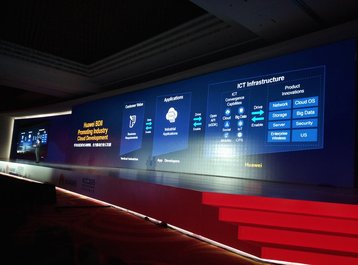The rise of the industry cloud is inevitable, Huawei’s enterprise group president Yan Lida told the Huawei Cloud Congress 2015 in Shanghai last week.
In the past, IT was a separate function, which gave organizations an advantage over competitors or helped get things done faster, but the future will see IT becoming inseparable from production systems, Yan Lida said during the event’s keynote. This will be enabled by a cloud architecture consisting of a blend of infrastructure-as-a-service (IaaS) optimized for the task at hand, along with industry-specific platform-as-a-service (PaaS) and software-as-a-service (SaaS) clouds.
Specialized clouds for verticals
These specialized cloud offerings will integrate industry applications and ICT services, and serve the disparate needs of various enterprises and industry verticals, said Yan, while outlining a paradigm that maps exactly onto Huawei’s offering introduced earlier this year - Business Driven ICT Infrastructure (BDII).
Yan gave more details on BDII, highlighting how applications developed in the industry cloud serve to spur cloud-enabled innovations in traditional ICT infrastructure. On the other hand, the proliferation of open ICT hardware favored by Huawei also serves to enable the development of even more industrial applications.
And the company has made progress in its BDII vision, with Yan pointing out various financial and media cloud solutions on stage. For the latter, he drew attention to a Huawei cloud solution in use by the Hainan TV station.
Reporters or video crew can now shoot video and upload it in real-time, he said. The video can be tagged and accessed for editing from the private cloud, and then transferred to a public cloud for transcoding and broadcast.
“We believe that hybrid cloud is very important to [the] media industry in the future,” he said.
Yan admitted that Huawei cannot possibility address every niche in the industry cloud, especially the industry-specific applications which will be critical to the success of the BDII. For these, the company will be looking for partnerships, he said, as it develops an industry cloud ecosystem.

